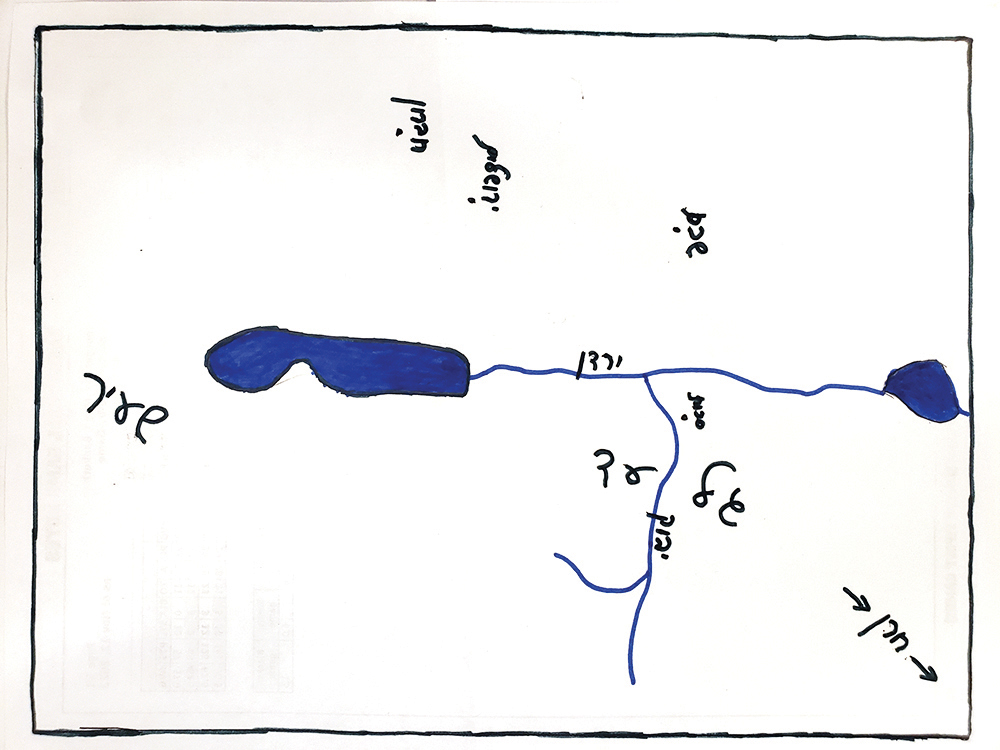
Yaakov’s return trip from חרן to חברון was quite eventful. He was chased by his father-in-law, Lavan, who caught up with him at הר הגלעד (Bereishis 31:23). His next stop was (מחנים (32:3, where he saw angels (32:2). He sent messengers to his brother, Eisav, who was in (שעיר (32:4, which is south (and slightly east) of the Dead Sea, to try to reconcile with him (32:6). While asking God to save him from Eisav, who was coming towards him with a small army (32:7), Yaakov mentions “this (ירדן (32:11,” implying that he was either near the Jordan River or within sight of it. He plans to stay “there” for the night (32:14), preparing an elaborate gift for Eisav. It is unclear where “there” is. The last location mentioned is מחנים, while from the context (32:23-24) it is clear that he was near the יבוק (referred to as a wadi, but identified as the Zarqa River, a tributary of the ירדן). [Atlas Daat Mikra has מחנים well north of the יבוק; they must think Yaakov had left מחנים. Others have מחנים on the bank of the יבוק, so he could have still been there.] Despite having settled in for the night (32:14/22), Yaakov gets up in the middle of the night (32:23) and helps his family cross the יבוק. Back on the other side by himself, he is attacked by an angel (32:25, see 32:29/31), but holds his own. Yaakov rejoins his family (although we aren’t told that he crossed back over the יבוק), and has a seemingly pleasant reunion with his brother (32:1-15). Eisav goes back to (שעיר (33:16, while Yaakov goes to (סכות (33:17. [There were more stops before Yaakov arrives in חברון, but this provides the necessary background for the geographical issue I am about to raise.]
Getting to חברון (which is west of the Dead Sea) from גלעד (which is northeast of the Dead Sea) requires traveling both south and west. Yaakov could have crossed the ירדן (which runs north to south, emptying into the Dead Sea) north of the יבוק (which runs east to west through גלעד, emptying into the ירדן)—thereby avoiding having to cross the יבוק—but he went south on the eastern side of the ירדן (in order to meet up with Eisav)—crossing the יבוק from north to south. Since he went to סכות after crossing to the south bank of the יבוק, it (סכות) must be south of the יבוק, right? The Even Shoshan Concordance, in its entry for סכות, does say it’s a “city on the east side of the Jordan, south of Wadi Yabbok.” However, this seems to be a minority opinion.
Based on the Talmud Yerushalmi (Shevi’is 9:2), most associate סכות with Deir Alla, which is just north of the יבוק, slightly east of the ירדן. [The maps in Atlas Daat Mikra and The Carta Bible Atlas have סכות north of the יבוק.] How could סכות be north of the יבוק if Yaakov went there after crossing to its south bank?
Rashi (32:25, based on Bereishis Rabba 77:3, see also Tanchuma Vayishlach 8) tells us that the “man” who wrestled with Yaakov was Eisav’s administering angel (Sama’el). In other words, this encounter was part of the struggle between Yaakov and Eisav. But other Midrashim paint a different picture. Tanchuma Yoshon (7) says that when God saw that Yaakov was afraid of Eisav, He sent Micha’el to fight against Yaakov. Yalkut Shimoni (132), discussing the opinion that it was Micha’el, adds that Micha’el told Yaakov he shouldn’t be afraid of Eisav, since he was able to hold his own against an angel. Radak (32:25) expresses a similar idea; God sent an angel to wrestle with Yaakov so that—after seeing that an angel couldn’t overpower him—Yaakov would no longer fear Eisav.
We can understand why Sama’el would injure Yaakov after seeing that he couldn’t defeat him, but why did Micha’el injure him? And why did Yaakov get up in the middle of the night to cross the יבוק?
Rashbam and Chizkuni explain that “[Yaakov] intended to escape [from Eisav] using a different route.” Instead of facing Eisav (as originally planned, which is why he sent messengers in the first place), Yaakov changed his mind and tried to run away. Either this change of mind occurred in the middle of the night, and Yaakov wasted no time trying to implement it, or he felt the nighttime was the best time to try to escape. Micha’el was sent to prevent Yaakov from escaping, and when he couldn’t hold him back, injured him, so that he couldn’t avoid facing Eisav.
Since Yaakov was crossing the יבוק in order to escape from Eisav, he went in the opposite direction, from its south bank to its north bank, after having previously crossed it (when he was going towards Eisav) from north to south. [We weren’t told when Yaakov crossed the יבוק the first time, just as we aren’t told he crossed the ירדן going from סכות to (שכם (33:17-18; crossing the יבוק (the second time) was only mentioned because it facilitated his being separated from his family before the wrestling match.]
So, did Yaakov cross the יבוק from north to south, or from south to north? If he fought with Sama’el on his way to Eisav, it must have been from north to south, and סכות would be south of the יבוק. If, however, he fought with Micha’el, who was trying to prevent Yaakov from avoiding Eisav, then he likely crossed it twice, once in each direction, and סכות would be north of the יבוק.
Rabbi Dov Kramer crosses the Passaic, Hackensack and Hudson Rivers from west to east on his way to Manhattan each weekday, and from east to west coming home. When the WFAN studios were in Queens, he drove across four rivers each way, at least after he moved from Kew Gardens Hills to Passaic.












